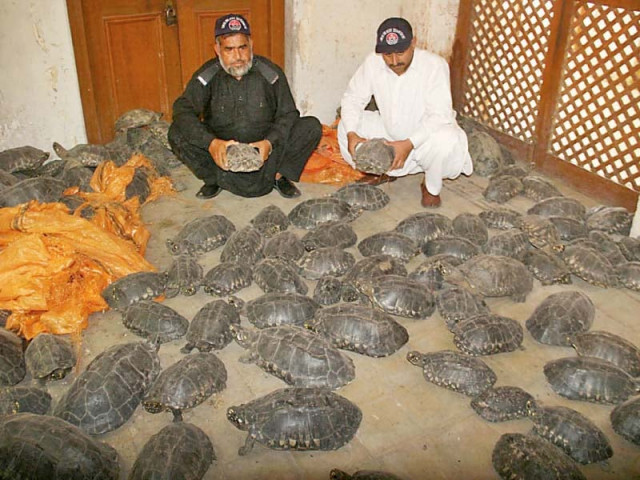Back to the wild: Recovered turtles to be released in Indus River today
Six people, including three Chinese nationals, in custody for illegal trading

The turtles, kept in the wildlife dept’s offices, will be released into the Indus River between Guddu and Sukkur barrages. PHOTO: ONLINE
According to the department's chief conservator, Saeed Baloch, more than 700 turtles which were confiscated by Sindh wildlife department and Gizri police from a bungalow will be released into the Indus River between Guddu and Sukkur barrages.
According to Sindh Wildlife Ordinance 1972, after the confiscation of wild animals, the department either takes monetary compensation from the smugglers or produces them in court, Baloch said.
The official said that since the smugglers are 'high profile' in this case, the department produced them in court which issued a release order for the wild animals.
The department's deputy sanctuary warden Adnan Hamid Khan told The Express Tribune that six Pakistani nationals have been granted bail on the surety of Rs50,000 each and on condition that they deposit the surety amount the same day. However, three Chinese nationals and three Pakistanis, who were also taken into custody during the raid, are in custody for allegedly illegally trapping and trading the wild animals. He said that according to the law, the department produced the turtles in court on Saturday and will release them in their natural habitat today.
Hamid said that the wildlife department is currently facing a huge challenge to take care of the turtles, which weigh up to 10 kilogrammes each. According to him, most of the recovered turtles are unable to eat properly since they are away from their natural habitat and encaged. Speaking about how the department is taking care of the turtles, Hamid said that in order to maintain the temperature of these cold-blooded animals, wildlife officials have been deputed to continuously spray water on them.
Animal rights' activists raise voice
In a press statement issued by Shehri-Citizens for a Better Environment, the non-governmental organisation (NGO) expressed its concern about the smuggling of animals. The NGO said that the Sindh government should not release the smugglers arrested during the raid on Friday. The organisation claimed that there is pressure on officials to release the suspects and the recovered turtles are being kept on the floor of the wildlife department.
Trade of billions
In a press statement, WWF-Pakistan said the police and wildlife department confiscated 780 black-spotted turtles on September 9, 2016 and arrested nine traffickers, including three foreigners.
WWF-Pakistan Director General Hammad Naqi Khan said the illicit wildlife trade of freshwater turtles, particularly in black pond turtles, is escalating in Pakistan and about 850 black-spotted turtles have so far been confiscated by law enforcement agencies in 2016.
He added that the legal action and penalties against the offenders should be aligned with the Pakistan Trade Control of Wild Fauna and Flora Act 2012 to set an example for others involved in similar criminal activities. 'A revision in the Sindh Wildlife Protection Act is therefore critical, to give a proper coverage to the illegal wildlife trade and enhance penalties against the wildlife traffickers to discourage this crime,' he added.
Black-spotted turtles are listed in Appendix-I of the Convention on International Trade in Endangered Species of Wild Fauna and Flora (CITES) and their trade in any form is globally restricted.
Illegal wildlife trade has been recognised as the second biggest threat to wildlife after habitat destruction and is estimated to generate $23 billion annually, the statement informed.
Published in The Express Tribune, September 11th, 2016.



















COMMENTS
Comments are moderated and generally will be posted if they are on-topic and not abusive.
For more information, please see our Comments FAQ